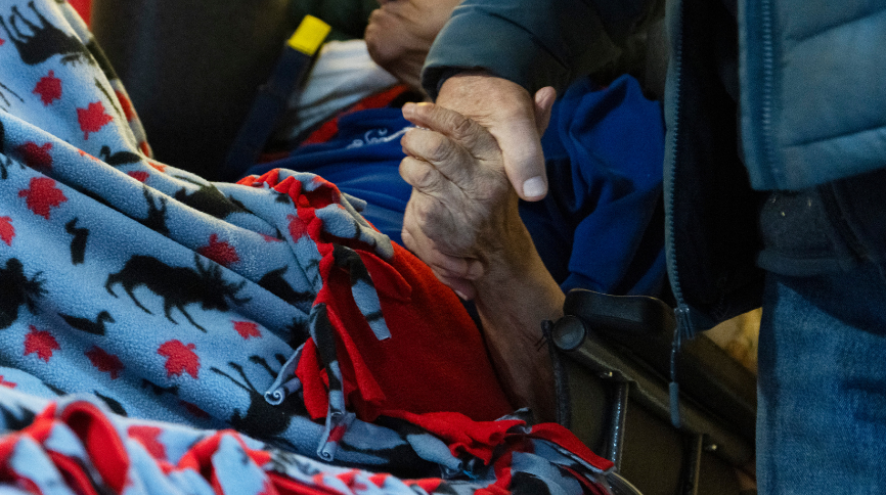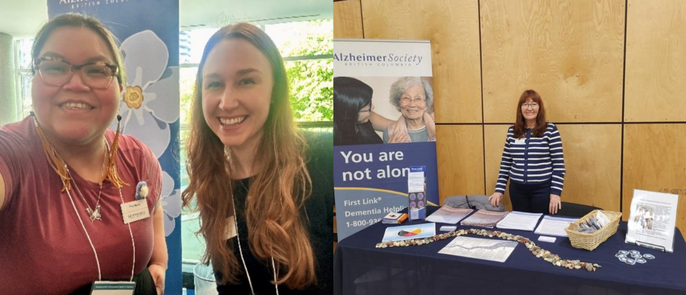First Nations, Métis and Inuit resources
The stories and information shared here were created alongside First Nations, Métis and Inuit partners and reflect trauma-informed and culturally safe approaches to dementia. We aim to support families, caregivers and communities with tools that honour traditional knowledge and holistic wellness.

Our intentions
We recognize that to build relationships with Indigenous peoples, communities and organizations, we must first create a culturally safe and trauma-informed environment for First Nations, Métis and Inuit peoples to feel safe to access services and supports from the Alzheimer Society of BC and Yukon Four intentions have been established to help build this trust:
Respect – The Society recognizes the inherent Rights and Title of each Indigenous community on Turtle Island in relation to their ancestral lands. We also acknowledge the unique cultures, world views, languages and traditions that exist within each community.
Acknowledgement of the past – We cannot ignore our past, because it will influence our present, especially in the case of someone living with dementia. We recognize that intergenerational trauma has been caused by social and political injustices towards Indigenous peoples and that this trauma continues to this day. By understanding and acknowledging the past, we hope to become a more trauma informed and culturally safe organization.
Culturally informed resources – Materials need to resonate with and reflect the values, beliefs and practices of the First Nations, Métis and Inuit communities and people we serve. We respect the deeply rooted ancestral knowledge and culture held within communities which also includes traditional healing practices. We will walk alongside Indigenous peoples and communities to develop resources and supports that are representative and relevant for their particular needs.
Relationships – Engagement in meaningful collaborations with Indigenous elders, Knowledge Keepers, organizations and communities is essential to creating a culturally safe and trauma informed environment.
Stories
The Morin family
This video was created by Derek Flynn Photography and shares the journey of one family’s experience of dementia. It showcases the Tāłtān nation’s territory, where the Morin family is from and travels to, as they are currently living on Wet'suwet'en territory (Smithers). The video reflects the family’s daily and nightly routine with their mother, Janell. The song in the video was created by Peter and Janelle as they started their dementia journey, and has been translated into their traditional language. Instead of using the English term “Alzheimer’s disease,” the phrase “the heart always knows” is used to describe their mother’s experience and their family’s ancestral connection and relationship to this experience. To learn more about the Morin family, read their story or watch our lived experience webinar, “Different roadmaps for caregiving.”
The Gitxsan Health Society
This video was created in 2020 in collaboration with the Gitxsan Health Society, the First Nations Healthy Authority and the Alzheimer Society of BC and Yukon. This project was the result of a year-long study that explored how dementia is represented within one community, the Gitxsan Nation. We want to acknowledge that this video reflects the perspectives and views of the Gitxsan Nation and we recognize that each nation will have their unique perspectives of dementia that may be very different from this one.
We invite you to view this video by visiting the FNHA’s YouTube channel through this link.
Collaborations
Nativeglam
We are proud to share our collaboration with Tāłtān, Ts'msyen and Nisg̱a'a artist Natasha Seymour, who created traditional beaded brooches of a forget-me-not flower in honour of her grandfather, who has been living with Alzheimer’s disease since 2012. The forget-me-not flower is used as a symbol by Alzheimer Societies, representing a reminder to honour and support people living with dementia, along with their caregivers, families and communities.

These brooches were created using Indigenous-sourced materials specifically chosen by Natasha for their symbolic properties. Please see below to learn more about the significance of the materials she used for this project.

Natasha returned to the traditional art of beading, and started @Nativeglam, during COVID to connect to and share her community with a broader audience.

Engagement
The Alzheimer Society of BC and Yukon is working with First Nations, Métis and Inuit communities and organizations to develop relationships. We connect through health fairs and booths across the province. We continue to listen and learn in order to develop resources and supports that are culturally safe, trauma-informed and reflective of the communities we serve. These new resources will be featured on this page as they are developed.

Sch'awatn Health Education Forum
The Indigenous Outreach and Collaboration team was invited to host a booth at the First Nations Health Authority’s Sch'awatn Health Education Forum (April 2025). We had the opportunity to engage with a wide range of health professionals, including many home care nurses at this event.
Ehattesaht Health Fair
Local staff had the opportunity to host a booth at the Ehattesaht Health Fair on March 20, 2025. It was a full day of events, healing ceremonies and networking.
Webinars
Our weekly Wednesday webinar series provides accessible learning opportunities while creating the space for us to share important stories and perspectives. The following webinars feature Indigenous storytelling, research or collaboration:
Lived experience panel I Different roadmaps for caregiving
Our lived experience partner, Peter Morin, joined this panel discussion to share his unique experience caring for his late mother throughout her dementia diagnosis. In this webinar, viewers will learn how panellists navigated stigma, discrimination and isolation and hear about the sources of support and strategies that have helped them on their journeys.
Research connects I Indigenous art and storytelling in virtual reality
The Alzheimer Society of BC and Yukon pleased to have built a longstanding partnership with the University of British Columbia’s IDEA (Innovation in Dementia and Aging) Lab. As part of their work, their team collaborated with the Museum of Anthropology and Indigenous partners to research how immersive VR storytelling media can connect Indigenous people living with dementia to their culture and reduce stress during hospital visits.
Additional resources
- The First Link® Dementia Helpline
- Lived experience partnerships
- The Canadian Charter of Rights for People with Dementia
- Flipping Stigma Toolkit: An Action Group's Guide
- Alzheimer Society of Canada - Dementia Information for Indigenous Peoples: First Nations, Métis and Inuit
Contact us by reaching out to:
Sheri Weget, LPN
Provincial Coordinator, Indigenous Outreach and Collaboration
Email: sweget@alzheimerbc.org
Phone: 778-693-3438
